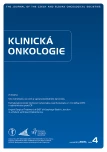Oncology Case Report – When Is the Appropriate Time to Integrate Palliative Care?
Authors:
Lukáš Pochop 1; Radka Alexandrová 2; Ondřej Sláma 1; Andrea Jurečková 1; Lucie Světláková 1; Ondřej Bílek 1; Jiří Šedo 1; Rostislav Vyzula 1
Authors‘ workplace:
Klinika komplexní onkologické péče, Masarykův onkologický ústav, Brno 2 Úsek klinické psychologie, Masarykův onkologický ústav, Brno
1
Published in:
Klin Onkol 2019; 32(4): 303-305
Category:
Case Report
doi:
https://doi.org/10.14735/amko2019303
Overview
Many patients with advanced, non-curable cancer experience disease progression to a stage requiring symptomatic care alone. The integration of palliative care into oncology practice is therefore important, with many studies showing the benefits of early introduction of palliative care. In addition to symptom relief, palliative care can include psychological, social, and spiritual support. Although all oncologists provide basic palliative care, recent data indicate that the parallel involvement of a specialist palliative team that addresses the psychological, social, and spiritual needs of patients may be advantageous for both patients and their families. This mode of early integration of palliative care has been found to enhance patient quality of life and to provide more effective use of costly treatments. In Czech hospitals, however, this mode is rarely employed. Palliative care is usually perceived as an end-stage approach, which is initiated only when all other anticancer treatment modalities have been exhausted. This case describes the challenges and missed opportunities when palliative care was initiated late during the dying phase of a young female patient with metastatic colorectal cancer, and it discusses the potential benefits of early integration of palliative care.
Supported by Ministry of Health of the Czech Republic, grant No. 15-33590A. All rights reserved.
The authors declare they have no potential conflicts of interest concerning drugs, products, or services used in the study.
The Editorial Board declares that the manuscript met the ICMJE recommendation for biomedical papers.
Submitted: 27. 11. 2018
Accepted: 7. 6. 2019
Keywords:
palliative care – psycho-oncology – colorectal neoplasms
Sources
1. Kühne F, Krattenmacher T, Beierlein V et al. Minor children of palliative patients: a systematic review of psychosocial family interventions. J Palliat Med 2012; 15 (8): 931–945. doi: 10.1089/jpm.2011.0380.
2. Sieh DS, Mejer AM, Oort FJ et al. Problem-behavior in children of chronically ill parents: a meta-analysis. Clin Child Fam Psychol Rev 2010; 13 (4): 384–397. doi: 10.1007/s10567-010-0074-z.
3. Temel JS, Greer JA, Muzikansky A et al. Early palliative care for patients with metastatic non-small-cell lung cancer. N Engl J Med 2010; 363 (8): 733–742. doi: 10.1056/NEJMoa1000678.
4. Sochor M, Sláma O, Loučka M. Časná integrace paliativní péče do standardní onkologické péče – benefit, limitace, bariéry a druhy paliativní péče. Klin Onkol 2015; 28 (3): 171–176. doi: 10.14735/amko2015 171.
5. Kaasa S, Loge JH, Aapro M et al. Integration of oncology and palliative care: a Lancet Oncology Commission. Lancet Oncol 2018; 19 (11): e588–e653. doi: 10.1016/S1470-2045 (18) 30415-7.
Labels
Paediatric clinical oncology Surgery Clinical oncologyArticle was published in
Clinical Oncology

2019 Issue 4
- Possibilities of Using Metamizole in the Treatment of Acute Primary Headaches
- Metamizole at a Glance and in Practice – Effective Non-Opioid Analgesic for All Ages
- Metamizole vs. Tramadol in Postoperative Analgesia
- Spasmolytic Effect of Metamizole
- Safety and Tolerance of Metamizole in Postoperative Analgesia in Children
-
All articles in this issue
- Current Perspective on HPV-Associated Oropharyngeal Carcinomas and the Role of p16 as a Surrogate Marker of High-Risk HPV
- Role of the Microbiome in the Formation and Development of Colorectal Cancer
- Methods of Classical and Molecular Cytogenetics Suitable for Biodosimetry of Persons with Professional Exposure to Carcinogens
- BMI and Odds of Endometrial Adenocarcinoma in Czech Women – a Case Control Study
- The Pharmacoeconomic Analysis of Cetuximab and Panitumumab in the 1st Line Treatment of mCRC in Real Clinical Practice in the Czech Republic
- Incidence and Risk Factors of Distant Metastases of Head and Neck Carcinoma
- Oncology Case Report – When Is the Appropriate Time to Integrate Palliative Care?
- Farmakoekonomické studie a procesy HTA při hodnocení nákladů a benefitů nákladné inovativní léčby u nás i ve světě
- Aplikovat jeden cyklus nebo jednu sérii chemoterapie?
- Zemřel prof. MUDr. Josef Koutecký, DrSc., zakladatel dětské onkologie
- Onkologie v obrazech Kožní toxicita při cílené léčbě generalizovaného melanomu
- P21-Associated ncRNA DNA Damage-Activated Expression in Bladder Cancer
- The Role of Radiotherapy in Skull Metastasis of Thyroid Follicular Carcinoma
- Urgent Surgical Treatment of GIST of Esophago-Gastric Junction in a Patient with Giant Hiatal Hernia
- Proposed Strategies for Improving Adherence to Tyrosine Kinase Inhibitors in Patients with Chronic Myeloid Leukaemia
- Clinical Oncology
- Journal archive
- Current issue
- About the journal
Most read in this issue
- Role of the Microbiome in the Formation and Development of Colorectal Cancer
- Current Perspective on HPV-Associated Oropharyngeal Carcinomas and the Role of p16 as a Surrogate Marker of High-Risk HPV
- Oncology Case Report – When Is the Appropriate Time to Integrate Palliative Care?
- Incidence and Risk Factors of Distant Metastases of Head and Neck Carcinoma
